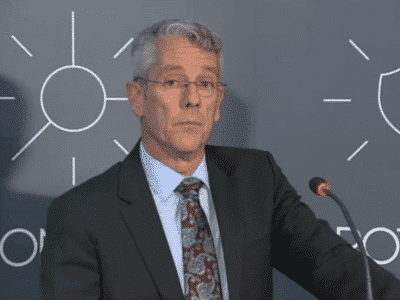
 Canadian Radio-television and Telecommunications Commission chairman Jean-Pierre Blais gets to play tough-talking sheriff again tomorrow, a role he seems to relish while he tears each of Canada’s four biggest TV service (and Internet) providers a new one, owing to their unenthusiastic efforts to comply with the CRTC’s order to offer “skinny basic” $25 cable packages.
Canadian Radio-television and Telecommunications Commission chairman Jean-Pierre Blais gets to play tough-talking sheriff again tomorrow, a role he seems to relish while he tears each of Canada’s four biggest TV service (and Internet) providers a new one, owing to their unenthusiastic efforts to comply with the CRTC’s order to offer “skinny basic” $25 cable packages.
Wednesday’s hearing, aside from being another valuable chance to enact Blais’ Theatre of Cruelty that we’ve become accustomed to, happens to also be a license renewal hearing for Canada’s big four “terrestrial broadcasting distribution undertakings (BDUs) that will expire in 2016,” adding that this will be a review of their “implementation of certain conditions of licence and review of practices in regard to the small basic service and flexible packaging requirement for all BDU licensees.”
No one is expecting Jean-Pierre Blais to deny license renewals for Rogers Communications, Shaw Cablesystems, Bell Canada and/or Videotron tomorrow morning when they accept their now ritual public lashing.
But yet another round of political theatre, with no consequences for the telcos other than Blais’ anger, threatens to dilute his credibility as CRTC chairman.
After all, what has been accomplished this year, and what outcomes are we hoping to achieve through CRTC regulation?
Netflix will no doubt be discussed at tomorrow’s hearing, all to the benefit of Netflix which snubbed Blais and refused to answer basic questions about its Canadian business the one and only time they appeared before Blais and his committee.
The telcos will use Netflix as an excuse, saying to Blais, “What do you want us to do? This unregulated over-the-top service is eating our business alive. And you want us to go out of our way to offer a $25 basic cable package while Netflix ignores you and does whatever it wants?”
According to Solutions Research Group’s quarterly Digital Life Canada report in July, roughly 5.2 million Canadian households pays for a Netflix subscription, meaning that Netflix is nearing 50% market penetration. Five years ago, that figure was 11%.
In the third quarter of 2015, Netflix had an estimated 3.48 million Netflix paying streaming subscribers in Canada, meaning that they added over a million subscribers in less than a year.
So the numbers are moving in the right direction for Netflix, which you would think would really bother Jean-Pierre Blais, seeing as it’s his job to regulate telecommunications in Canada.
“Corporate executives cannot bury their heads in the sand and pretend that change isn’t happening. They must rise up and meet the challenge of a new content era head on. The old way of doing business—of squeezing every last drop of profit out of simultaneous substitution and rented, made-in-America content—is no longer sustainable.” – Jean-Pierre Blais in February
But of the approximately 13 million households, more than 11 million of them pay for some kind of television service, according to the latest Statistics Canada figures, meaning that cable’s dominance remains more or less total.
Many households maintain a both/and approach when it comes to cable and Netflix (the other streaming offerings from Bell, Rogers and Shaw, Crave TV and Shomi, only have about 700,000 subscribers between them, so for all intents and purposes when we talk about streaming video, we are talking about Netflix).
The only reason people hang on to those cable subscriptions is live sports.
If a “Netflix of Sports” came along tomorrow, providing reliable service at a reasonable cost, the telcos would see their subscriber base shrink away from market dominance to almost nothing, as people’s final reason for maintaining a cable subscription would vanish.
For people who don’t care about sports, these are glorious times. High-speed internet, a decent monitor and a VPN, and the world is your oyster. Why would you even consider having a cable subscription?
Take sports out of the equation, and the need for cable simply disappears. It turns out, however, that sports remains a very large part of people’s TV equation.
As for Canada’s “skinny basic” packages, consumers are frustrated. It turns out that $25 gets you all the channels that people complain they don’t really care to watch, and that adding a sports channel purchased à la carte will cost enough extra that it’s easier to just sign up for a package, which for most people makes skinny basic a meaningless gesture.
Skinny basic must have seemed like a good idea at the time, until it began being implemented at which point everyone, both subscribers and cable companies, realized it was a waste of time.
But Blais had to have known that this is what was going to happen. The requirements for skinny basic that he himself set out were very clear. And the telcos have implemented what he asked for, albeit reluctantly.
It would be disingenuous of him tomorrow to punish the telcos for obeying the letter but not the spirit of the law, unless of course he regards these hearings primarily as political theatre.
On December 1, things get even worse for the telcos, as they are mandated to implement true pick-and-pay, allowing Canadians to order only what they want off the television menu, rather than accepting the usual “special of the day” or “all you can eat” type offers.
Meanwhile, Netflix Canada has the Star Wars movie, and Stranger Things is quite good.
Unless Blais and the telcos get serious about improving outcomes for Canadian cable subscribers, which means regulating the non-terrestrial broadcasting distribution undertakings, namely Netflix, things will remain frustratingly the same for the Canadian TV market, except for the fact that by this time next year Blais and the telcos will be arguing over an increasingly decimated TV landscape.
But so far, Blais hasn’t demonstrated any appetite for a showdown with Netflix. And the Culture Minister, Melanie Joly, has also publicly nixed the idea of a Netflix tax.
This leaves the CRTC and Blais in an awkward position. If Netflix isn’t on the table at these hearings, then what’s the point?
For all his tough-talking sheriff bluster, Blais has become highly skilled at letting the status quo roll along more or less undisturbed.
For people who don’t care about sports, these are glorious times. High-speed internet, a decent monitor and a VPN, and the world is your oyster. Why would you even consider having a cable subscription?
If Netflix acting the spoiler in all this has somehow been beneficial to Blais’ negotiating position with the telcos, rather than proving to be a nose-thumbing humiliation, then you might begin to understand some kind of method to his apparent lack of interest.
But there doesn’t seem to be any method, either overt or covert.
After the Big Four make their presentations tomorrow morning, a few interveners will get to talk, first the Consumers’ Association of Canada, and then the Union des consommateurs who will make precisely the same case en français.
Speaking at the Canadian Club of Toronto this past February, Jean-Pierre Blais sounded like he was on a mission.
“The television system must follow our lead,” said Blais. “Corporate executives cannot bury their heads in the sand and pretend that change isn’t happening. They must rise up and meet the challenge of a new content era head on. The old way of doing business—of squeezing every last drop of profit out of simultaneous substitution and rented, made-in-America content—is no longer sustainable. Truly great content is what draws viewers. Those that make that content will thrive.”
That’s both tough and inspiring talk. We’ll see by the end of 2016 whether he was able to help shepherd that “new content era” into existence.
But tomorrow Blais and the Big Four telcos will re-enact their antagonistic dance, and Canadians will continue to be frustrated at the cost and quality of product on offer, and by this time next year Netflix will have added another million to its subscriber base.
What’s on Canadian TV again?
Leave a Reply
You must be logged in to post a comment.




 Share
Share Tweet
Tweet Share
Share




Comment